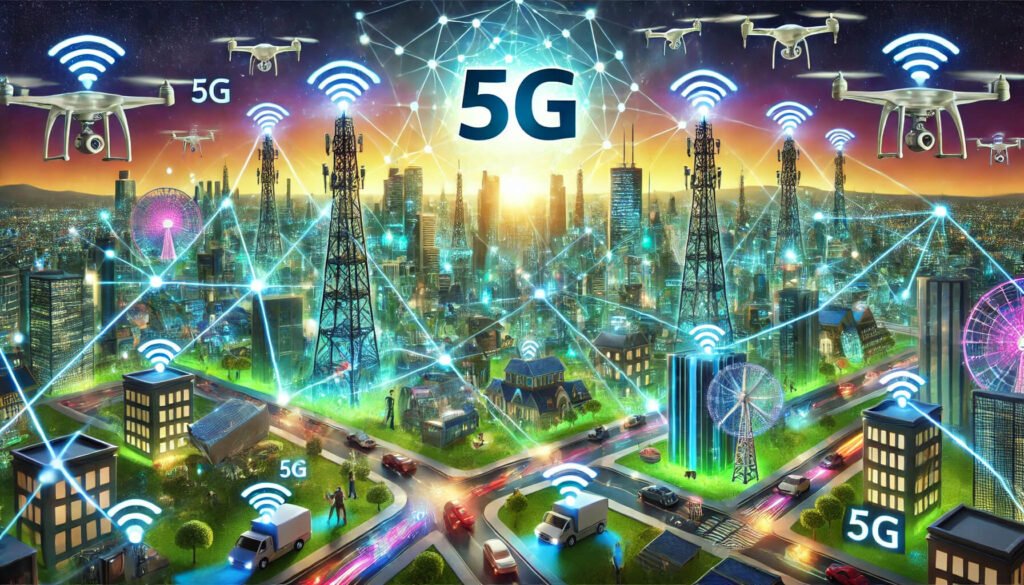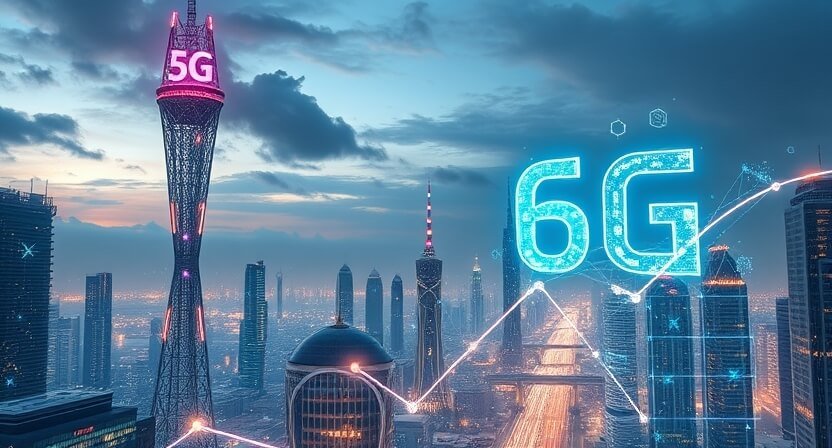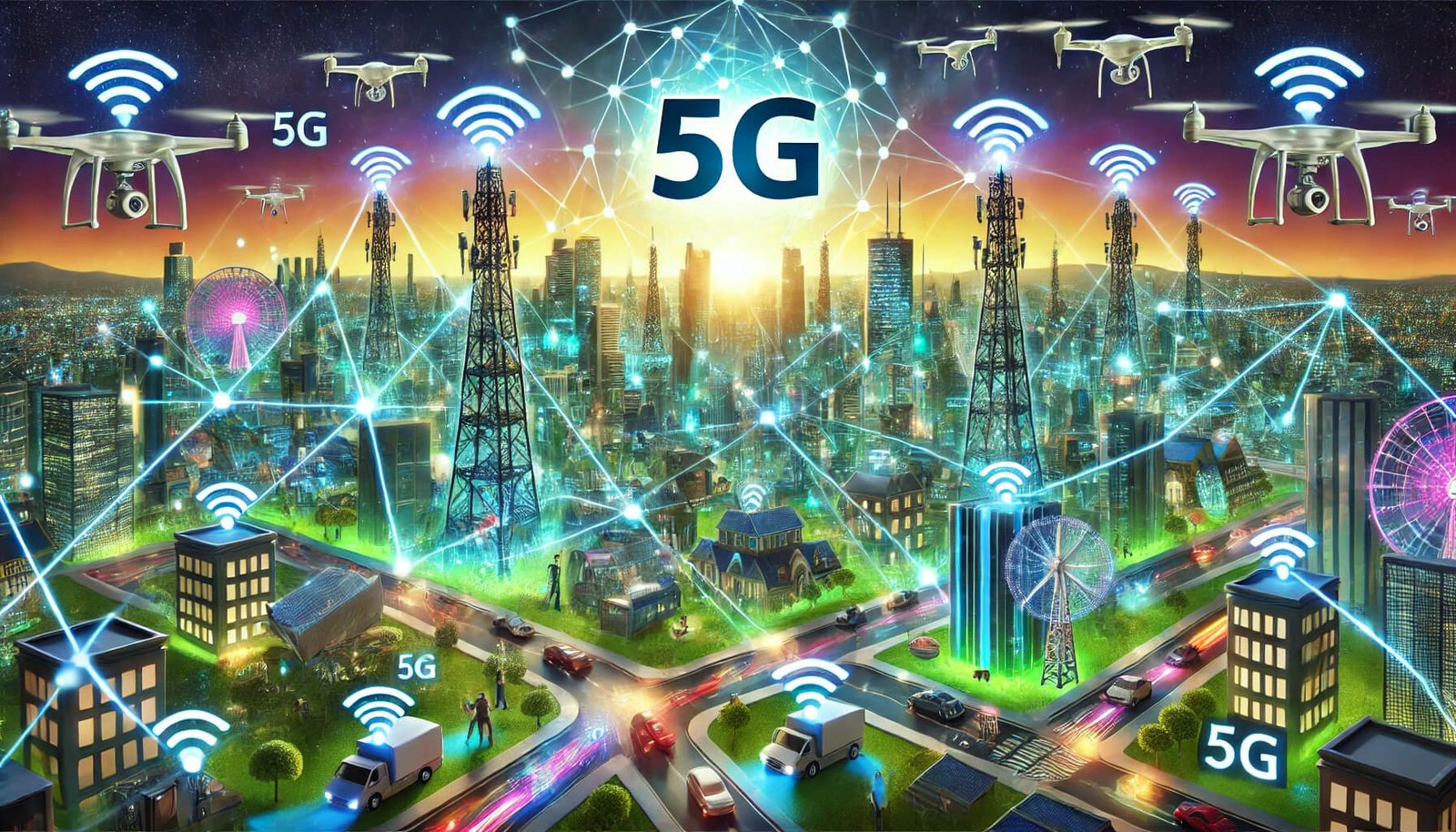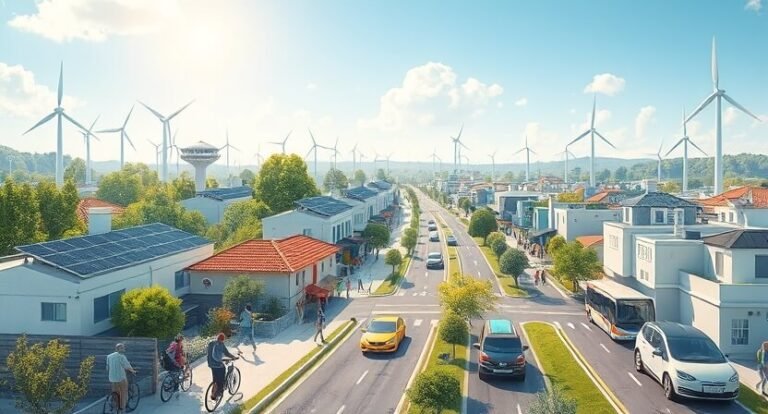
5G Technology and Beyond: Unlocking the Future
Wireless technology has evolved dramatically over the decades, transforming how we communicate, work, and interact with the world. From the early days of 1G analog phones to the blazing speeds of 5G, each generation has brought us closer to a future where instant, seamless connectivity feels like second nature. But what happens next? As 5G continues to roll out, the focus is shifting to the next frontier: 6G and beyond.
This article dives into what 5G technology has achieved, the challenges it faces, and the groundbreaking innovations on the horizon that promise to revolutionize how we live, connect, and thrive in the digital age.
What Is 5G Technology and Why Does It Matter?
5G, the fifth generation of wireless technology, is more than just an upgrade—it’s a complete overhaul of how devices communicate. It brings:
- Faster Speeds: With download rates up to 10 Gbps, 5G is about 100 times faster than 4G. Tasks like streaming 8K videos or downloading a full movie happen in seconds.
- Low Latency: 5G cuts latency to as little as 1 millisecond, ensuring near-instantaneous data transmission. This is crucial for real-time applications like gaming, autonomous vehicles, and remote surgery.
- Massive Connectivity: Unlike 4G, which supports about 2,000 devices per square kilometer, 5G can connect over 1 million devices. This makes smart cities and dense IoT (Internet of Things) ecosystems feasible.
5G in Action: Transforming Our World
1. Enhanced Mobile Experiences
For the average consumer, 5G means uninterrupted video streaming, lag-free gaming, and ultra-fast internet speeds. Beyond that, it enables richer interactions, like high-quality video calls and AR/VR experiences.
2. Healthcare Innovations
- Remote Surgeries: With 5G’s low latency, surgeons can operate on patients across the globe using robotic tools.
- Wearable Health Devices: Smartwatches and other devices now monitor vital signs and send real-time updates to healthcare providers.
3. Smart Cities
5G allows cities to optimize resources, reduce energy consumption, and improve public safety with interconnected systems like smart traffic lights, waste management sensors, and surveillance networks.
4. Industrial Automation
Manufacturing processes are becoming more efficient with 5G-enabled automation, predictive maintenance, and AI-driven robotics.
Where Are We Now With 5G Deployment?
The United States has aggressively rolled out 5G networks through carriers like Verizon, AT&T, and T-Mobile. Major metropolitan areas enjoy wide 5G coverage, while rural areas are gradually being integrated.
However, challenges persist:
- Infrastructure Costs: 5G requires more base stations and small cells than 4G, which raises deployment costs.
- Spectrum Allocation: The limited availability of spectrum bands can slow implementation.
- Rural Access: Bridging the connectivity gap in less populated areas remains a work in progress.
Beyond 5G: What’s Coming Next?

While 5G is still transforming industries, researchers are already laying the groundwork for 6G and other advancements. Here’s a glimpse into the wireless future:
1. The Promise of 6G
Expected to roll out by 2030, 6G will surpass 5G with:
- Speeds of Up to 1 Tbps: This is 100 times faster than 5G, enabling instant data downloads and uploads.
- Near-Zero Latency: Latency could drop to mere microseconds, unlocking futuristic technologies like brain-computer interfaces.
- Holographic Communication: Imagine lifelike holograms replacing video calls, making remote interactions feel as real as in-person ones.
- AI-Driven Networks: Artificial intelligence will optimize network performance, adapting dynamically to user demands and environments.
2. Satellite Internet
Companies like SpaceX and Amazon are building satellite constellations to provide internet access globally. This technology will ensure connectivity even in the remotest areas, bridging the digital divide and complementing 5G and 6G networks.
3. Quantum Communication
Quantum technology could enable unhackable communication channels, critical for securing sensitive data in finance, government, and personal communication.
4. Integration with IoT
The number of IoT devices is projected to exceed 50 billion by 2030, with everything from refrigerators to cars connected. 6G’s speed and capacity will ensure these devices communicate seamlessly.
How 6G and Beyond Will Reshape Industries

1. Healthcare
- AI Diagnostics: Machine learning will analyze patient data in real time for faster diagnoses and treatments.
- Telemedicine Evolution: High-speed networks will make virtual healthcare more immersive and precise.
2. Transportation
- Autonomous Vehicles: Cars will communicate with each other and with smart infrastructure, reducing accidents and improving traffic flow.
- Smart Logistics: Real-time tracking and automated deliveries will transform supply chains.
3. Education
- Virtual Classrooms: Students in rural areas will experience the same quality of education as their urban counterparts through VR and AR classrooms.
- Global Collaboration: Instant translation tools powered by 6G could enable seamless collaboration across borders.
4. Entertainment
- Immersive AR/VR: Movies, games, and concerts will be experienced in 360-degree virtual environments, blurring the lines between real and digital worlds.
- Cloud Gaming Revolution: Gamers will no longer need high-end hardware as games stream directly from the cloud.
Interactive Section: Imagine a Day in the 6G Future
Your Morning:
- Your alarm clock, synced with your smart home, gradually brightens the lights and brews your coffee.
- Your autonomous car drives you to work while you attend a holographic meeting.
Your Afternoon:
- A quick virtual consultation with your doctor confirms you’re in good health. The wearable health device on your wrist tracks your vitals throughout the day.
Your Evening:
- You and your best friend, located thousands of miles apart, attend a live concert in a virtual stadium using holographic technology.
Challenges and Ethical Considerations
As exciting as these advancements are, they come with challenges:
- Privacy Concerns: More connectivity means more data collection. Ensuring privacy in an increasingly digital world is paramount.
- Energy Consumption: Advanced networks require significant power. Researchers must develop energy-efficient systems.
- Digital Divide: Ensuring equitable access to these technologies across socio-economic groups and geographies is crucial.
The Emotional Connection: Why Wireless Connectivity Matters
Wireless connectivity isn’t just about technology; it’s about people. It’s about enabling a grandmother to video chat with her grandchild, connecting remote workers to global opportunities, and giving every child access to world-class education. It’s about building a world where distance and physical barriers no longer limit human potential.
Final Thoughts: Embracing the Wireless Future
The evolution from 5G to 6G and beyond promises an unprecedented era of innovation, connection, and opportunity. However, it’s up to us to ensure these advancements are accessible, ethical, and sustainable.
Are you ready to be part of this incredible journey? Share your thoughts on how you envision the future of wireless connectivity impacting your life.
Conclusion: A Future of Limitless Possibilities

The journey from 5G to 6G and beyond is nothing short of revolutionary. We’re on the brink of a future where connectivity not only enhances our daily lives but also unlocks new opportunities for growth, innovation, and human connection. Imagine a world where everything—from your healthcare to your entertainment—is seamlessly interconnected, and distance no longer stands in the way of success or joy. Whether it’s a life-changing medical procedure performed remotely, a holographic meeting that feels just as real as face-to-face interaction, or a smart city that adapts to your needs, wireless technology will be at the heart of it all.
But as we move forward, it’s important to remember that these advancements are not just about technology. They’re about people. They’re about the opportunities they create, the lives they improve, and the new ways we can connect and communicate. The next generation of wireless connectivity promises not just a faster internet, but a connected world where everyone has access to limitless potential.
So, what’s next? The possibilities are endless. Are you ready to embrace the future?
Summary: A Glimpse into Tomorrow’s Connectivity
In this article, we explored the transformative power of 5G technology and its far-reaching impacts on industries like healthcare, entertainment, transportation, and beyond. With lightning-fast speeds, ultra-low latency, and the capacity to connect millions of devices, 5G is already changing the way we live and work.
But we’re just getting started. 6G is already on the horizon, promising even faster speeds, near-zero latency, and even more innovative applications like holographic communication, AI-driven networks, and global connectivity via satellite internet.
As these technologies evolve, they promise to create a more interconnected world—one where barriers like distance and physical limitations are no longer obstacles to our progress. However, the future also brings challenges, including privacy concerns, energy consumption, and equitable access to these advancements.
In the end, the wireless future is about much more than technology—it’s about creating a better, more connected world for everyone. So, get ready. The next generation of connectivity is here, and it’s about to change everything.
FAQs: Unlocking the Future of Wireless Connectivity
1. What exactly is 5G, and why should I care?
Great question! 5G is the fifth generation of wireless technology, and it’s a game-changer. With blazing fast speeds, almost instant connection times, and the ability to connect millions of devices simultaneously, it’s designed to make your daily life smoother, faster, and more connected. Whether you’re streaming, gaming, or using smart devices in your home, 5G is what makes it all possible—and it’s just getting started!
2. How will 5G impact my life in the real world?
Picture this: you’re video chatting with a friend across the globe with no buffering, streaming an 8K movie without a single hiccup, or driving your self-driving car while attending a virtual meeting. 5G isn’t just about speed—it’s about unlocking new possibilities in entertainment, healthcare, education, and even how we work and communicate every day.
3. What makes 6G so exciting?
Hold on to your seat! 6G is set to be 100 times faster than 5G, with speeds that could reach up to 1 terabit per second. But that’s just the start—6G will enable things like holographic communications, AI-driven networks, and virtually zero latency, which means we can have real-time, lifelike conversations and experiences no matter where we are. Imagine a world where technology feels less like a tool and more like an extension of your senses!
4. Will 5G be available everywhere?
It’s rolling out fast in major cities across the U.S., but rural areas are still catching up. While 5G coverage is expanding, it’s not yet universal, and there are challenges like infrastructure costs and spectrum limitations. But the good news? The drive to bring universal access to fast, reliable internet is stronger than ever, so 5G’s reach is only going to grow.
5. How does 5G affect industries like healthcare or transportation?
In healthcare, 5G allows for life-saving remote surgeries and real-time health monitoring, while in transportation, it can power autonomous vehicles and smart cities. Imagine a future where you can virtually attend a doctor’s appointment from anywhere, or your car knows the best route to take to avoid traffic—all thanks to 5G’s super-fast, reliable connections.
6. What will 6G mean for everyday people?
For you and me? It means that the world will be more connected than ever before. From immersive virtual experiences to instant access to the services and information we need, 6G will create a seamless connection between our digital and physical lives. Holograms, real-time AI translation, and even better healthcare—all just a blink away!
7. Are there any downsides to 5G and beyond?
As with all technology, there are some challenges, especially around privacy, security, and energy consumption. As we connect more devices and collect more data, protecting our personal information will become a top priority. But the promise of creating a more equitable and connected world is worth striving for. And yes, accessibility will be a major factor in ensuring no one is left behind as we move forward.
8. How soon will we see 6G?
6G isn’t expected to be fully rolled out until around 2030, but researchers are already working on laying the groundwork. By the time it arrives, the possibilities will feel like something out of a sci-fi movie, and we’ll be ready to embrace it all!
9. How can I get ready for the future of wireless technology?
Start by embracing the 5G revolution in your own life! Upgrade to a 5G-compatible phone, explore the world of smart devices, and begin thinking about how new technologies like AI, IoT, and cloud computing can make your life easier and more efficient. The future is fast approaching, and the more we prepare today, the more we’ll benefit tomorrow!
10. How can these technologies change the way we connect emotionally with each other?
It’s all about deepening our connections and making our relationships feel more real and immediate. Imagine being able to experience your loved one’s presence through a hologram, or receiving a personalized health consultation from your doctor, no matter where they are. 5G and 6G will break down barriers, bringing us closer together even when we’re physically far apart. In a world that’s always changing, this connection is what will keep us grounded and supported.
11. Will 5G increase my internet bill?
You might be wondering if all this amazing technology will come at a higher cost. In the short term, some providers may charge a bit more for 5G access, but as the technology becomes more widespread, we expect prices to level out. Plus, the value you’ll get in terms of speed, reliability, and access to new services will make it worth the investment. Think of it as paying for a better future—one that’s faster, more efficient, and more connected!
12. Will 5G affect my phone’s battery life?
Great question! While 5G offers incredible speeds, it does tend to consume more power, so you might notice your phone’s battery draining a little faster than before. However, manufacturers are working hard to optimize battery life with new technologies and improvements in power management. In the long run, the convenience and connectivity 5G brings will make it a trade-off worth making.
13. Can 5G impact the environment?
Yes, 5G technology will require a lot of infrastructure, which can have an environmental impact, especially in terms of energy usage. However, the industry is moving toward greener solutions, including using renewable energy sources and more energy-efficient network equipment. As we push for more sustainable tech, the goal is to ensure that the power of 5G doesn’t come at the expense of our planet’s future.
14. Will 5G make everything “smart”?
Absolutely! 5G will act as the backbone for a massive expansion of the Internet of Things (IoT), making everyday objects smarter and more connected. From your smart fridge that orders groceries for you to wearable devices that track your health in real time, 5G will allow everything to interact with each other seamlessly. The smart home, smart cities, and smart everything are closer than ever!
15. How will 5G help during emergencies?
5G’s low latency and reliability could make a significant impact in emergency situations. Imagine real-time disaster management systems, faster emergency response times, and remote health diagnostics that can save lives. Whether it’s a natural disaster or a medical emergency, 5G can play a crucial role in providing the help people need when they need it most.
16. What industries will be most impacted by 5G and 6G?
While every industry will benefit from 5G and 6G, some of the most impacted will be:
Healthcare: Real-time health monitoring, remote surgeries, and instant communication between patients and doctors.
Transportation: Autonomous vehicles, smart roads, and efficient traffic management systems.
Entertainment: AR/VR experiences, ultra-high-definition streaming, and interactive media.
Manufacturing: More efficient smart factories, real-time inventory tracking, and automation of complex processes.
These technologies will help revolutionize industries, bringing more innovation, efficiency, and better outcomes for everyone involved.
17. Can 5G help close the digital divide?
Yes, 5G has the potential to bridge the digital divide by providing high-speed internet access to underserved and rural communities. As the technology grows, more people will have access to the resources they need for education, business, healthcare, and so much more—giving everyone a fairer shot at success in an increasingly digital world.
18. How secure will 5G networks be?
Security is one of the most important aspects of 5G technology. With millions of connected devices and the potential for sensitive data transfer, the risks are higher. However, 5G comes with enhanced security protocols designed to protect against cyber threats. These networks are designed with the highest standards of encryption and safety, ensuring that our personal data stays private and secure. As we move toward 6G, even more advanced security measures will be put in place to keep us safe in an increasingly connected world.
19. Will 6G be available globally?
While 6G is still in its early development stages, the goal is to make it a global technology. There will likely be a period where different countries roll out 6G at different times, but with international collaboration, we expect it to become a universal standard. Just as 5G is spreading across the globe, 6G will eventually reach every corner of the world, connecting people in the most remote areas to the future of connectivity.
20. Will 5G impact my job or career?
Definitely! 5G will open up new career opportunities in industries like AI, cybersecurity, healthcare, and more. It will create new roles in tech development, network management, and data analysis as businesses transition to more digitally connected environments. Whether you’re in tech or not, the skills you develop today—like adaptability, problem-solving, and tech literacy—will prepare you for the jobs of tomorrow. 5G isn’t just changing your phone—it’s changing the world of work!




